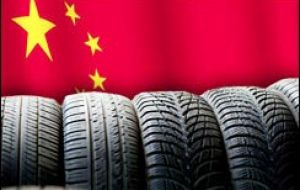MercoPress. South Atlantic News Agency
Beijing reacts to higher tyre’ tariffs with probes into US poultry and cars
 US dumping and subsidies practices have harmed domestic industries, alleges Chinese Commerce Department
US dumping and subsidies practices have harmed domestic industries, alleges Chinese Commerce Department Beijing announced it would launch anti-dumping and anti-subsidy investigations into some United States imported vehicles and chicken products from the United States, the Ministry of Commerce said Monday, escalating a trade disputes which was triggered when the US decided to raise tariffs on Chinese-made tires.
The commerce ministry said in a statement it would look into complaints from Chinese manufacturers that US auto and chicken products entered the Chinese market via unfair trading methods involving dumping and subsidies, which harmed domestic industries.
“China will carry out the investigations in accordance with Chinese laws and the rules of the World Trade Organization,” the ministry said. It said China remained firmly opposed to protectionism.
“China has always opposed protectionism and has demonstrated this stance with its actions since the outbreak of the global financial crisis. China is willing to cooperate with countries to push forward the recovery around the world,” it said.
Zhou Shijian, a former Chinese trade official and now a senior research fellow of China-US relations at Tsinghua University, said the investigation was a quick response to the US ruling on Chinese tire exports.
“China made public its investigations at this very sensitive moment,” Zhou said. “The timing suggests the Chinese government wants to show it is not happy with tariffs that are set to be imposed upon Chinese tires.”
On Friday night, the administration of US President Barack Obama decided to back the complaint from the Steelworkers of America and to impose tariffs on Chinese tire exports at 35% for the first year, 30% in the second and 25% in the third.
China strongly opposed the US decision, regarding it as serious trade protectionism, and Ministry of Commerce spokesman Yao Jian said China would reserve all rights to take responsive action to protect the interests of Chinese companies.
Cao He, a trade analyst at Mingzu Securities Co, said China's investigations would not have a serious consequence on China-US trade.
“US exports of vehicles to China are small in number compared with those from Japan and South Korea, and they are only investigations, not concrete tariff actions,” Cao said.
“But it may deal a blow to the world economy, as people may consider it the trigger for trade wars between two world economic powerhouses.”
Patrick Mendis, vice president of Academic Affairs at the Osgood Center for International Studies in Washington, said trade wars were unlikely to become main-stream because they did not benefit anybody.
“I regret the US made such a decision on Chinese tire exports,” Mendis said in Shanghai where he is on a lecture tour.
He said such disputes only constituted a small part in the China-US relationship, adding that the broader picture between the two countries remained positive.
China and the US banned each others' poultry in 2004 following an outbreak of bird flu in Asia. But China lifted the ban after a few months and has complained that the US refused to do the same.
Since then, China has imported more than 4 million tons of US poultry.
The WTO launched an investigation of the US ban on Chinese poultry at the end of July. China told the WTO dispute settlement body that the US had imposed protectionist measures by completely banning Chinese chicken products entering its market.
The US trade deficit with China totalled 103 billion USD in the first half of 2009, down 13% from the same period last year.




Top Comments
Disclaimer & comment rulesCommenting for this story is now closed.
If you have a Facebook account, become a fan and comment on our Facebook Page!